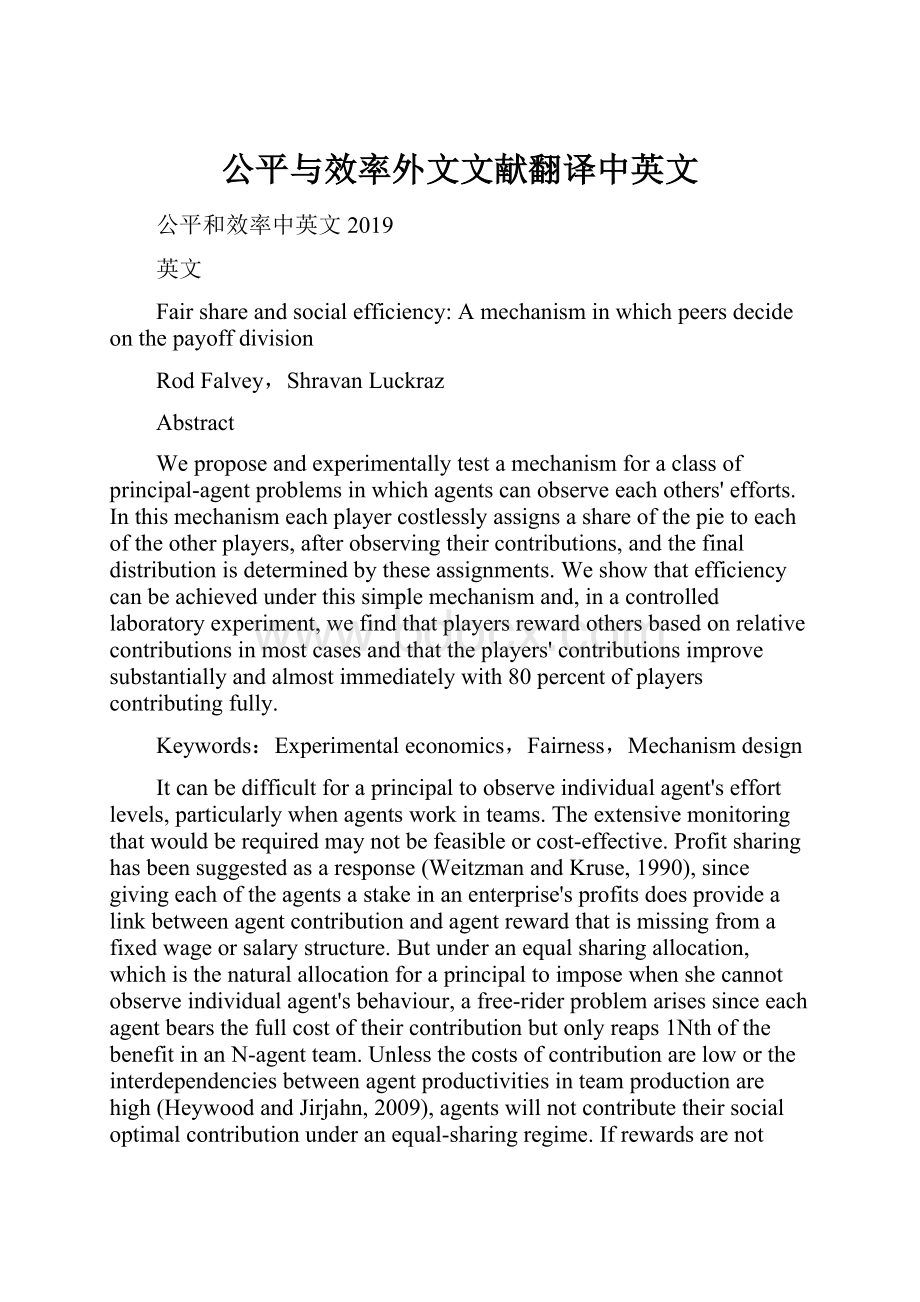公平与效率外文文献翻译中英文.docx
《公平与效率外文文献翻译中英文.docx》由会员分享,可在线阅读,更多相关《公平与效率外文文献翻译中英文.docx(12页珍藏版)》请在冰豆网上搜索。

公平与效率外文文献翻译中英文
公平和效率中英文2019
英文
Fairshareandsocialefficiency:
Amechanisminwhichpeersdecideonthepayoffdivision
RodFalvey,ShravanLuckraz
Abstract
Weproposeandexperimentallytestamechanismforaclassofprincipal-agentproblemsinwhichagentscanobserveeachothers'efforts.Inthismechanismeachplayercostlesslyassignsashareofthepietoeachoftheotherplayers,afterobservingtheircontributions,andthefinaldistributionisdeterminedbytheseassignments.Weshowthatefficiencycanbeachievedunderthissimplemechanismand,inacontrolledlaboratoryexperiment,wefindthatplayersrewardothersbasedonrelativecontributionsinmostcasesandthattheplayers'contributionsimprovesubstantiallyandalmostimmediatelywith80percentofplayerscontributingfully.
Keywords:
Experimentaleconomics,Fairness,Mechanismdesign
Itcanbedifficultforaprincipaltoobserveindividualagent'seffortlevels,particularlywhenagentsworkinteams.Theextensivemonitoringthatwouldberequiredmaynotbefeasibleorcost-effective.Profitsharinghasbeensuggestedasaresponse(WeitzmanandKruse,1990),sincegivingeachoftheagentsastakeinanenterprise'sprofitsdoesprovidealinkbetweenagentcontributionandagentrewardthatismissingfromafixedwageorsalarystructure.Butunderanequalsharingallocation,whichisthenaturalallocationforaprincipaltoimposewhenshecannotobserveindividualagent'sbehaviour,a free-riderproblem arisessinceeachagentbearsthefullcostoftheircontributionbutonlyreaps 1Nthofthebenefitinan N-agentteam.Unlessthecostsofcontributionarelowortheinterdependenciesbetweenagentproductivitiesinteamproductionarehigh(HeywoodandJirjahn,2009),agentswillnotcontributetheirsocialoptimalcontributionunderanequal-sharingregime.Ifrewardsarenotrelatedtocontribution,anagentwhofeelsunder-compensatedmayendupreducinghercontribution.
Althoughtheprincipalmaybeunabletoobserveagents'contributions,therewillbeoccasionswheretheagentsthemselvesareinapositiontoobserveeachothers'actions.1 Thechallengethenfortheprincipalistodesignamechanismthatelicitsandusesthisinformationtoinducetheappropriatelevelsofcontributionfromtheagents.Inthiscontext,weconsiderasimplemechanisminwhichagentsarenotonlyabletomonitoreachother,butalsoinpositionstodetermineeachother'spayoffs.Themechanismweproposetakestheformofatwo-stagegame.Inthefirststage,eachplayerchoosessomecontributionlevelandinthesecondstage,afterhavingobservedeachothers'contributions,eachplayerproposesafractionofthetotalsurplustobereceivedbyeachoftheremainingplayers.Aplayer'sfinalsharedependsontheotherplayers'allocationtowardher.
Welabelourmechanismthe“GalbraithMechanism”(GMhereafter)astheideaisinspiredbyJohnKennethGalbraithwho,inanasidein TheGreatCrash1929,describedabonussharingschemeusedbytheNationalCityBank(nowCitibank)intheU.S.inthe1920s.Underthisschemeeachofficerwouldsignaballotgivinganestimatedshareofthebonuspooltowardseachoftheothereligibleofficers,himself/herselfexcluded.Theaverageoftheseshareswouldthenguidethefinalallocationofthebonustoeachoftheofficers(Galbraith,1963,p.171).Thissharingmechanismcanbeappliedtomanyeconomicproblemsincludinggameswithpositiveexternalitiesandprincipal-agentproblemsinwhichtheprincipalneedstodistributesomecommonresourceamongsttheagents.
ThecrucialfeatureoftheGMisthathowaplayerallocatessharesinthesecondstagedoesnotaffectherownpayoff.Therefore,playersareabletorewardorpunishtheirpeersbasedonthefirststageobservedactions.Anumberofstudieshavedemonstratedthatplayersexhibit socialpreferences to“punish”thosewhofree-rideonthegroupproduction(FehrandGächter,2000)andto“reward”thosewhocontributemorethanthegroupaverage(Seftonetal.,2007 ;NosenzoandSefton, 2012 ).Whilesuchsocialpreferencesmovetheoutcometowardssocialefficiency, self-interest tendstorestricttheirapplicationandthesocialcoststhatthesepunishmentsandrewardsimposeonallpartiesinvolvedtendtolimittheirultimatesuccess(see Chaudhuri(2010) forareview).3 TheGMisbasedonanendogenouspayoffallocationinwhichplayerscanfreelydecideonsomefractionoftheco-players'payoffs.Playersarefreetopunish,toreward,toallocateequallyoreventoallocaterandomlytotheremainingplayers,whilenocostsareincurredbyanyplayersintheallocationexercise.
Thedownsideofallowingplayersthefreedomtorewardandpunishinthiswayisapotentialformultiplicityof NashEquilibria atthesecondstageoftheGMgame.Withoutmorestructure,everyallocationisaNashEquilibriuminthesecondstage.Onemethodofremovingtheresultingarbitrarinessisbyexplicitlyincorporatingabehaviouralcomponentintothepayofffunction,whichcouldbeseenasreflectingtheplayer'ssubjectivenotionofa“fair”allocation.4 Butratherthanimposingasolutioninthisway,weleavethequestionofhowtheplayersactuallyallocatetobeuncoveredintheexperimentsthatfollow.Thatsaid,ourinvestigationofequilibriainthiscontributiongamedoesrevealalinkbetweenefficiencyand“fairness”.Muchofthetheoreticalliteratureonfairnessfocusesonequalityandequalshare(e.g., FehrandSchmidt,1999 )regardlessofcontributions.Butagrowingempiricalliteratureappealstootherfairnesscriteriatojustifyunequalallocations,e.g., Adams(1965); Konow (1996; 2000; 2009); GächterandRiedl(2006); Cappelenetal.(2007); Shaw(2013); Cappelenetal.(2013).5 Prominenthereisthenotionofdistributivejusticefirstexploredbysociologists(Homans,1958; Adams,1965)andlateradoptedbybehaviouraleconomists(Selten,1978 ).
Distributivejusticeisoftendefinedbytheprinciplethataplayer'sentitlementtowardssomegroupoutcomeshouldbeproportionaltohercontributiontothatoutcome.6 Inthenextsection,weestablishthatsuch“fair”allocationbehaviourcansupportefficiency(fullcontributions)aspartofaSPNEofthiscontributiongame,forallpositivereturnstototalcontributions.Itisapivotalcaseinthatothermorepro-contributionbiasedallocations(i.e.allocationsthatgivedisproportionatelylargerallocationsharestothosewithhighercontributionshares)alsosupporttheefficientequilibriumunderthesameconditions,butanti-contributionbiasedallocations(i.e.allocationsthatgivedisproportionatelylargerallocationsharestothosewithlowercontributionshares),suchasequalshares,onlysupporttheefficientequilibriumathigherreturnstototalcontributions.Proportionalallocationsfeatureprominentlyinourexperimentalresults.
TheGMisalso“simpler”thanotherendogenousmechanismsproposedtosolvesocialdilemmaproblems.Forexample, AndreoniandVarian(1999) studiedamechanismwhereplayerscanagreeonapre-playcontractbeforeplayingthe prisoner'sdilemma game.However,theirmechanismdoesnotperformwellwhentestedinlaboratorysettings(Hamaguchietal.,2003; Brachtetal.,2008).Whilethereareothermechanismsthatperformbetterinthelaboratory,forexample, Falkingeretal.(2000); Masudaetal.(2014) and Stoddardetal.(2014),theyeitheraddanenforcementinstitution,or“impose”aninformedthirdpartytoallocatetheshares.Inthecontextofanuninformedprincipalandinformedagents,theGMisamethodofdetermininganinformedallocationfortheprincipaltomakewhichrequiresonlythattheprincipalcollatetheallocationsharesproposedbytheplayersanddistributeaccordingly.7 Providedtheplayersareinclinedtorewardcontributioninthesecondstage,andtheyanticipatethishappeningatthefirststage,theGMshouldyieldoutcomesclosertosocialefficiencythananequalsharesmechanism.8
Perhapsthemodelclosesttooursis Baranski(2016) whoconsidersaclassofvoluntarycontributionmechanisminwhichtheplayers'sharesofthegroupfundaredeterminedusinga BaronandFerejohn(1989) multilateralbargainingprocedureinwhicheachplayercanberandomlychosentobeaproposeratacertainperiod.Ineachperiod,afteradivisionisproposed,theremainingplayerscanvotetoagreeordisagreewiththeproposal.Thebargainingprocessendsifamajorityagreewiththeproposerandthefundisdividedaspertheproposal.ThemostimportantdistinctionbetweenthismechanismandtheGMliesintheallocationstagewhichtakestheformofaone-shotgameintheGM,whereasinBaranski'smechanism,itisgivenbyamulti-stagebargainingprocess.Furthermore,theGMdoesnotrequirearandomlychosenproposeraseachplayersimplyproposesashareforhispeers.Intermsofexperimentresults,bothmechanismsenjoyasubstantialincreaseinthecontributionlevelsoncetheyareintroduced.9
Insummary,themaincontributionofthispaperistoproposeasimplemechanismandtotestitexperimentally.Asnoted,thismechanism:
(i)allowscostlessrewardandpunishmentattheallocationstage;(ii)removesthebiasarisingwhenaplayerproposesanallocationtohimself;and(iii)avoidsthenecessityofimposinganinformedallocatororrandomlyselectingoneaspartofabargainingprocess.Onlylowreturnstoscale,whereequalshareswouldnotautomaticallygeneratefullcontributions,areconsidered.Providedplayersrewardothersbasedontheircontributionsattheallocationstage,andanticipatesuchrewardsatthecontributionstage,weexpectthatsocialefficiencycanbeachievedunderthismechanism.Thisallocativebehaviourdoesseemtobeprevalentin